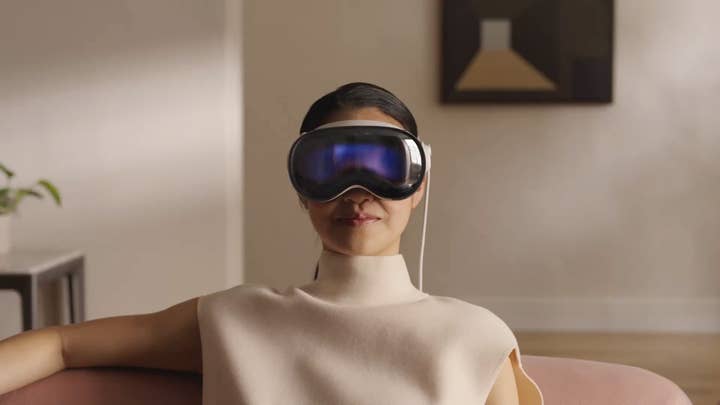The future's so bright, I gotta wear Apple's $3,500 shades | This Week in Business
Let's talk about reasons for optimism despite grim industry news and Apple's Vision Pro headset. Despite the headline, the two subjects are not related
This Week in Business is our weekly recap column, a collection of stats and quotes from recent stories presented with a dash of opinion (sometimes more than a dash) and intended to shed light on various trends. Check every Friday for a new entry.
It was another week of bad headlines in the games industry, with Eidos Montreal layoffs on Monday and a brief reprieve on Tuesday before Wednesday brought stories of Sega, Nimble Giant, GameSpot, and Artificer all cutting staff, and Square Enix's Tokyo RPG Factory closing entirely. Thursday we had layoffs at Airship Syndicate.
It's ugly out there, and it's been ugly for about a year now. You don't need me to tell you that.
This feels like the worst it's been in terms of layoffs since I started covering the industry side of games in 2005. The only thing I've seen come close was the 2008 financial crisis era, which saw giants like Sony and EA shedding staff like my old roommate's cat shed hair. (I know you don't know my old roommate or his cat, but it really was a spectacular amount).
The rush of horrible news isn't the only thing about this year that feels similar to 2008
The financial crisis claimed a host of operations large and small, from industry institutions like Midway and Electronic Gaming Monthly to well-regarded studios like Free Radical Design, Factor 5, and MS Flight Sim developer Aces Game Studio.
The rush of horrible news isn't the only thing about this year that feels similar to then. Because for all the hand-wringing, the basic business of games is trundling along just fine thank you very much, much as it was in 2008.
STAT | $21 billion – The NPD Group's US game industry software and hardware sales total for 2008, the largest it had ever been to that point.
STAT | $57.2 billion – Circana's US consumer spending on games total for 2023. That's not quite a record, as 2021 just barely topped $60 billion, but 2023 is still the second-best year on record for US spending on games. Last year was even slightly better than 2020's $56.9 billion, which you might remember benefitted from that whole pandemic-keeping-people-stuck-at-home-with-nothing-to-do-for-months-at-a-time thing.
And while we're unlikely to see any Activision Blizzard-scale acquisitions in the near-term, or even the ill-advised venture capital largesse of the blockchain and metaverse manias, people are clearly still willing to put money into games.
QUOTE | "There still is plenty of cash, plenty of interest, and plenty of willingness to do deals on the part of not only strategic buyers that we all know, but also private equity companies and other large financial institutions that want to get exposure to games." – At the Montreal International Games Summit last November, Agnitio Capital founder Shum Singh assured the developers in the audience that people still want to invest in games; they're just going to actually do their due diligence first.
STAT | 5 – The number of stories we had this week of studios finding new investment, including Carry1st, 8SEC, Loric Games, Order of Meta, and Mountaintop. Last week we saw investment into True Gamers, Obelisk Studio, and Talofa Games. And we've also been given a heads up on more funding news expected to arrive next week.
Add to that a smattering of newly established operations like Roro, Shapeshifter Games, Megabit, Narwhal Accelerator, ForthStar Games, Moonlight Studios, Hundred Star Games, and Astra Logical, and there are still a fair number of people out here in 2024 committing resources to fledgling game companies.
On top of that, the industry is expected to continue growing over the coming years, albeit at a more modest pace than in the pre-pandemic years. People still play a lot of games, and they spend a lot of money doing so. They will continue to spend lots of money on games in the future. The heart of the business is just fine, thanks.
If you want a few more reasons for positivity, our own Chris Dring today just posted a look at seven trends and events that could move the needle for the industry, from Nintendo's Switch successor to regulators opening up Apple and Google's mobile ecosystems so developers don't need to fork over 30% of their revenues straight away.
And as for the onslaught of layoffs stories, at this point some of that is self-reinforcing. I'm not just talking about layoff contagion, where highly paid executives abdicate all decision-making ability and just follow the crowd because of C-suite peer pressure. I'm also talking about basic news judgment here.
There have always been layoffs in the games industry. There has not always been thorough coverage of layoffs in the games industry
There have always been layoffs in the games industry. There has not always been thorough coverage of layoffs in the games industry. Even in recent years, the coverage of job cuts is far from what I would consider comprehensive.
It's entirely possible for companies to sweep some cuts under the rug, which is why you get Naughty Dog pressuring employees to keep quiet about layoffs for a couple dozen people and Riot Games admitting it was announcing its 530 layoffs last week because it was just too big a cut to get away with unnoticed.
But layoffs are the story of the moment. Employees (and ex-employees) are more likely to take news of these cuts to social media or the press, and the press is more likely to cover them because they play into a Big Ongoing Story.
Kotaku even has one big layoff story that it just updates with each new cut. I can't speak for another outlet's editorial decisions, but I suspect if this were almost any other year, Kotaku wouldn't be covering the layoffs of fewer than 10 people from 31st Union, a AAA studio that hasn't yet shipped a game (we also covered it), or indie studio Funselektor laying off three people (which we did not cover until this sentence).
The bar for what constitutes a newsworthy layoff is probably lower than in years past because the layoff trend is making them more newsworthy. It's a flaw in the way journalism works that the criteria for a news outlet's judgment on what is worth covering depends on what's happening, but our understanding of what's happening is heavily informed by what's being covered.
This can unfortunately be exploited to terrible ends, where outlets operating in bad faith can make a non-issue into a "public debate" that dominates headlines during an electrion season. But it can also happen organically, and in some cases make people's perceptions about a bad situation even worse than reality would support.
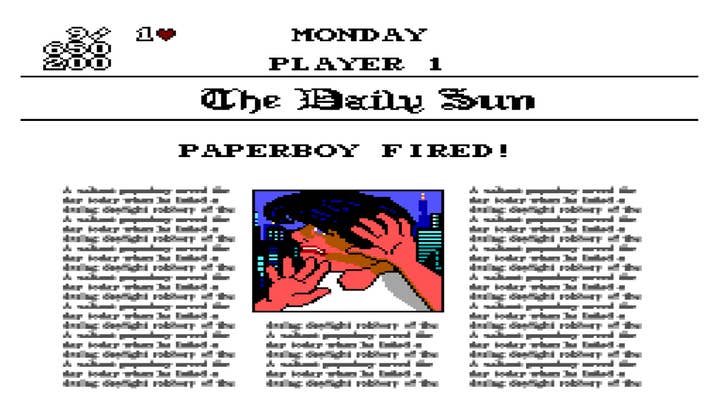
None of this is to say that everything is great, actually, or that people's fears are unjustified. Inflation is a real problem and it's hitting basically everyone regardless of industry. But many of the problems affecting games at the moment are not some unavoidable macroeconomic headwind; they are fundamentally direct consequences of actions people in the industry have been taking for years.
They are problems of businesses that badly misread what was happening in the pandemic and believed people would continue to accelerate their spend on video games even after they had the option of resuming their old leisure patterns. This idea of competing against "going outside" is particularly challenging when you consider the most popular and lucrative business models in gaming depend on maximizing engagement and playtime. They aren't just competing for people's money; they're competing for their time.
Many of the problems affecting games at the moment are not macroeconomic headwinds; they are consequences of actions people in the industry have been taking for years
They are problems of businesses that willfully lost money quarter-in and quarter-out in reckless pursuit of growth, confident that they could flip a switch and become profitable on demand. Oops.
They are problems of businesses expanding into new fields where they lacked expertise, fields that were often unproven or had entrenched competition that these newcomers would have to steal market share from (some of which were only entrenched because they were among those eager money-losers, making them doubly difficult to compete against).
They are problems of an investment community that got burned by augmented reality, blockchain, and the metaverse that is either beginning to learn its lesson or simply doesn't have the bankroll to chase the current Next Big Things with the same exuberance.
They are problems of an executive herd mentality, where nobody cares about running a sustainable business for years and then suddenly everybody cares about it, where laying off people by the thousands – a literally life-threatening action given the way the US ties your health care to continued employment – is seen as shrewd business rather than a cruel act sometimes taken needlessly by wildly profitable companies, or evidence of tremendous mismanagement when it came to staffing levels.
None of this had to happen this way. There were plenty of people warning that the pandemic bump was temporary, that blockchain was a pyramid scheme without a use case, that augmented reality wasn't ready for prime time, and that "the metaverse" was an ill-defined goal functionally indistinguishable from the online communities we've had for decades. (Those are all links to GamesIndustry.biz editorials, but it's not like we were alone in pointing this stuff out.)
And for some of those other things, like the idea that maybe a business should probably turn a profit at some point, I'm going to guess these executives were exposed to such radical ideas at some point on their way to getting an MBA.
But to paraphrase Upton Sinclair (no relation), it is very hard to get an executive to understand something when their bonus depends on them not understanding it.
Even so, I'm optimistic about the industry because I know that the fundamentals are solid and the suffering we see now is the direct result of individuals' bad choices. It's awful, and there's ample room to be angry that the people who led us to this are largely keeping their jobs even as they take away the jobs of hundreds or even thousands of people who worked for them.
But the bad news is temporary because these companies are in the business of selling games, and business remains good. And even in the midst of this span of dismally depressing headlines, there's still good news to be found, with more reliably on the way.
How do they like them Apple Vision Pros?
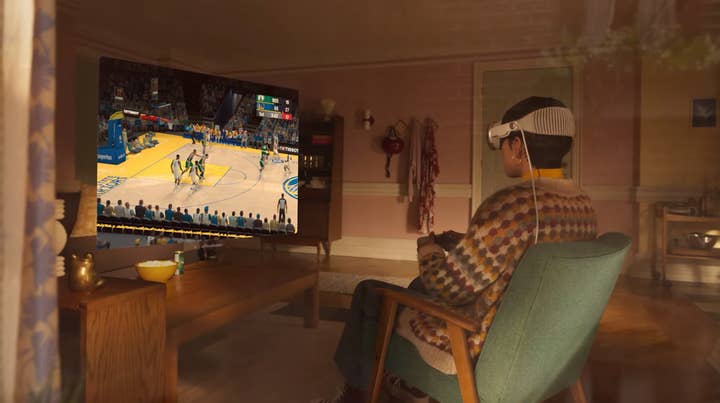
It's kind of remarkable that there's this much pessimism around the industry right now at the same time that Apple is making its long-awaited arrival into the VR/AR market with the Apple Vision Pro, which launches today.
When I say long-awaited, I'm not kidding. People were buzzing when Apple hired a VR expert in 2016, and the first report we saw of Apple readying an AR headset goes back to 2017.
Practically every AR market assessment of the past decade has been made with one eye on a hypothetical Apple entry, and now it's finally here but the buzz has been somewhat muted and the reviews are… predictable?
It's Apple, so the price is going to be high. $3,500 in this case, and reviewers seemed split on whether that was expensive, or unbelievably expensive.
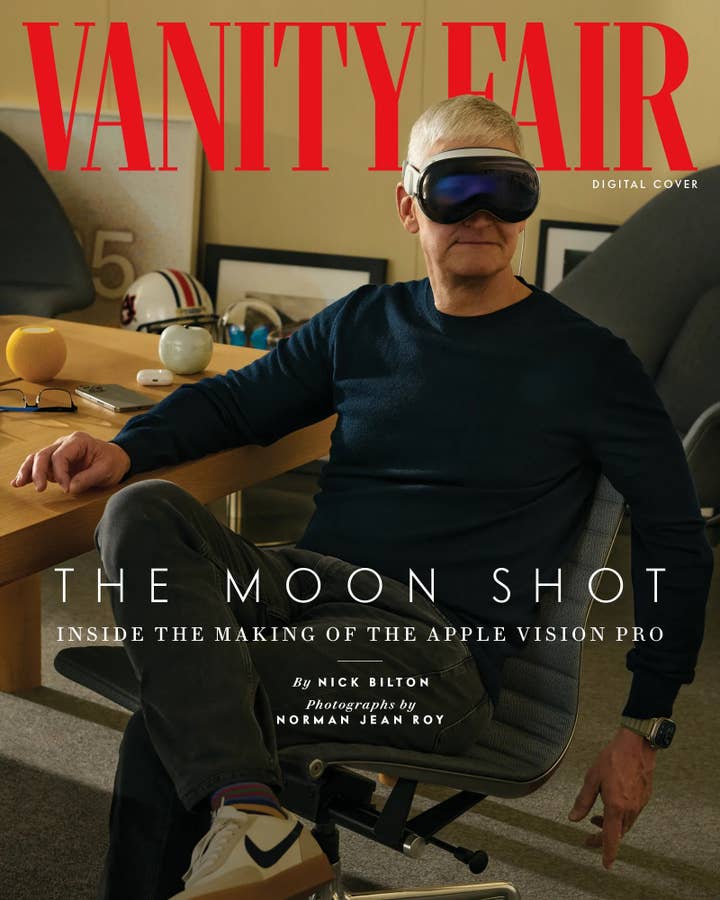
But it's Apple, so some of the tech and design will really impress. The Vision Pro headset got lots of love for its high-quality screens (the user-facing ones, at any rate) and some reviewers were quite pleased with the hand-tracking gesture controls and floating windows.
But it's also VR (or AR or XR or MR, if you insist these are all very different things and not just marketing terms for a convergent group of products), so there's going to be talk about weight, battery life, and nausea ad nauseum.
There was also another very clear theme, that the Vision Pro is only the beginning of the line here, and its problems would be improved upon in later iterations.
QUOTE | "Apple's headset has all the characteristics of a first-generation product: It's big and heavy, its battery life sucks, there are few great apps and it can be buggy. And come on, have you seen what this thing thinks I look like?" – Wall Street Journal tech columnist Joanna Stern, taking exception to the virtual 3D "persona" the Vision Pro makes of the user for video chat functionality.
QUOTE | "Apple's real opportunity will materialize when it finds a way to mass produce the Vision Pro at closer to $2,000, or less. Until then, it may be a niche product. But the experience blows everything else out of the water. It's Apple's most exciting product in years and it's the best example yet that this will become a new way of computing." – CNBC's Todd Haselton
Haselton genuinely seemed to like the Vision Pro, but I have to say, "Apple's most exciting product in years" doesn't say much at all. What's the competition there? Iterative updates to laptops, phones, and tablets? HomePod? The Apple Watch was almost nine years ago already, and "exciting" is not the first word that springs to mind when I think about it.
And then there was CNET's Scott Stein, whose amazement at the Vision Pro is either evidence that you really have to try the Vision Pro yourself to fully get it, or a loving write-up of the emperor's new clothes.
QUOTE | "I've been trying the Vision Pro as my own computer and it feels like monitors all around me. Over to my left is a 3D golf game. To my right is a floating set of photos. I've paired a Magic Keyboard and Magic Trackpad. I can float a TV. I can ask Siri to start playing some music. I can see my keyboard keys and the trackpad… There's an odd struggle, still, between virtual and real. But it's crazy how much does work. I'm writing this on a new product that hasn't even launched yet, and it already feels pretty powerful." – CNET's review of the Apple Vision Pro
To contrast that, I've been trying my computer as my own computer for decades now, and it feels like I have monitors all around me too. I have easy access to games, music, and photos; I've even paired a keyboard and mouse with it. I can see my keyboard keys and mouse pad. It's quite reasonable how much of this works. I'm writing this on an old product that launched a long time ago, and it feels pretty powerful. I think it can even run Crysis.
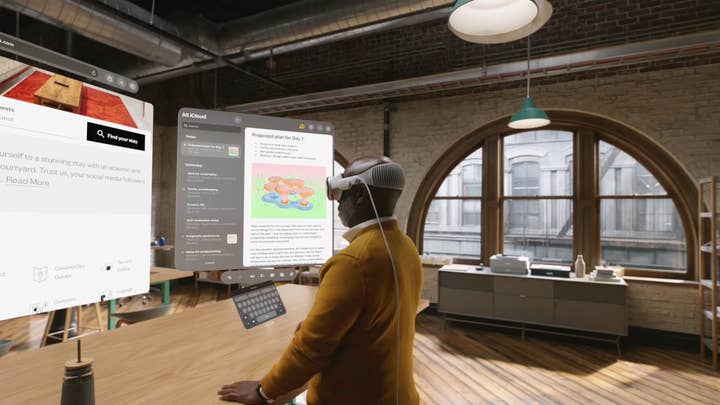
And as impressive as things like the video passthrough and the hand- and eye-tracking are, they still aren't quite good enough to replace the interfaces we already use on smartphones and PCs, at least in the estimation of The Verge editor-in-chief Nillay Patel.
QUOTE | "There are a lot of ideas in the Vision Pro, and they're all executed with the kind of thoughtful intention that few other companies can ever deliver at all, let alone on the first iteration. But the shocking thing is that Apple may have inadvertently revealed that some of these core ideas are actually dead ends — that they can't ever be executed well enough to become mainstream." – The Verge's review
Patel wraps up with a list of tradeoffs the Vision Pro has, tradeoffs that seem likely to impact any iterative approach on the headset. It's a computer that messes up your hair and makeup, that won't work as well in a dark room, a very expensive monitor with no HDMI inputs and no ability to easily show other people what you're looking at.
QUOTE | "And the biggest tradeoff of all is that using the Vision Pro is such a lonely experience, regardless of the weird ghost eyes on the front. You're in there, having experiences all by yourself that no one else can take part in. After using the Vision Pro for a while, I've come to agree with what Tim Cook has been saying for so long: headsets are inherently isolating." – Patel in the wrap-up of his review.
I haven't actually tried the Vision Pro myself yet, but judging by the things these reviews say do and don't work well, it doesn't sound like this is the thing that will move VR or AR from the future to the present.
The rest of the week in review
STAT | $21.9 billion – Microsoft's net income last quarter, up 33% year-over-year.
STAT | 1,900 – The number of people Microsoft laid off from its gaming business last week.
STAT | 49% - Konami's gaming business posted profits of $380.1 million last quarter, up 49% year-over-year. Sales were up 10.8%.
QUOTE | "There's not a lot of people that look like me, and I'm trying to be part of that change as well." – Curtis Baxter, senior writer at Cliffhanger Games on Black Panther, is our first developer featured in this month's Black Voices Progress Report.
QUOTE | "My philosophy is to remember that we're learning about something new when we make heroes. We have this opportunity to learn about a new culture. By no means am I an expert. But did I walk out of this experience knowing much more than I knew before going into it? Absolutely." – In a feature on the creation of Overwatch 2's Samoan hero Mauga, Blizzard's Kenny Hudson discusses the developer's efforts to respectfully represent people from under-represented cultures in gaming.
QUOTE | "We believe constructive conversations drive change and progress towards open platforms and greater competition. Apple's new policy is a step in the wrong direction. We hope they listen to feedback on their proposed plan and work towards a more inclusive future for all." – Xbox president Sarah Bond calls out Apple's policy change to comply with the European Union's Digital Markets Act by allowing iOS developers to use third-party app stores, but only if they pay Apple €0.50 for each install per year after the first million.
I will say that it's very funny that Apple was trying to dissuade developers from ever using third-party app stores and the absolute least appealing thing they could come up with was to copy the Runtime Fee scheme Unity rolled out in all earnestness last year.
STAT | 2 months – The time span between a Krafton employee reporting to the company that an executive had sexually assaulted her at a work party after The Game Awards and the company firing her, according to her new wrongful termination lawsuit.
QUOTE | "The games sector is Scotland's secret weapon. We have far more to offer Scotland's economy and future as a digital society than anyone realises." – Is that a secret weapon in Scotland's pocket or is Scottish Games Network director Brian Baglow just happy to see the Scottish government's plans to develop a national strategy to support the games industry?
STAT | 40 months – How long it took Genshin Impact to hit $5 billion in lifetime consumer spending, according to Data.ai. That's a new record, beating the 51-month mark set be Clash of Clans.
QUOTE | "It is clear to us that the old Nintendo model of proprietary hardware supported by compelling proprietary software is broken" – The latest 10 Years Ago This Month column features this 2014 quote from Wedbush analyst Michael Pachter, who responded to the Wii U's difficult launch by suggesting Nintendo drop the system and make PS4 and Xbox One games until its next console was ready. He was wrong, but as the column shows, most people were wrong about what Nintendo's next moves would be, including Nintendo itself.
STAT | 3 – The number of political parties in Germany that have jointly proposed a number of possible restrictions around loot boxes, including an outright ban.
It should be very concerning to the industry that even in hyper-polarized political times, loot boxes are an issue that can get traction and calls for change from basically all points on the political spectrum.
